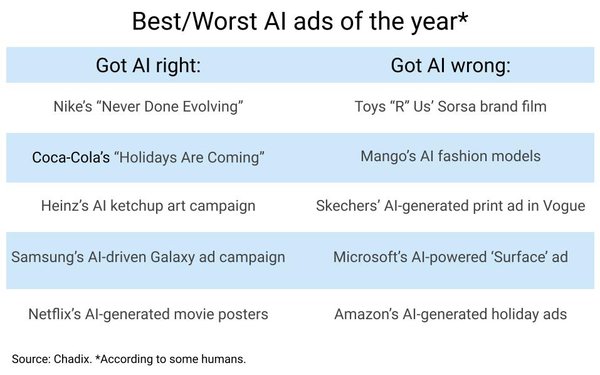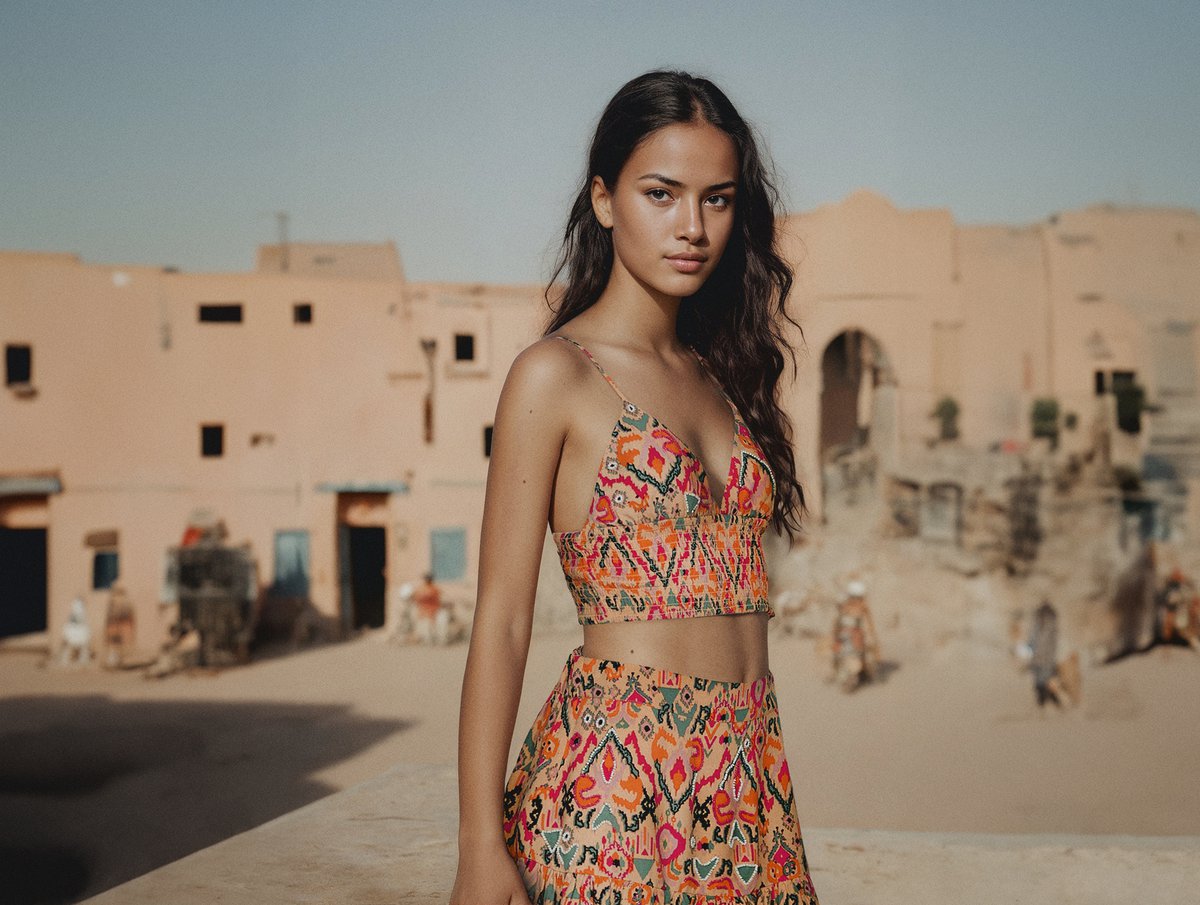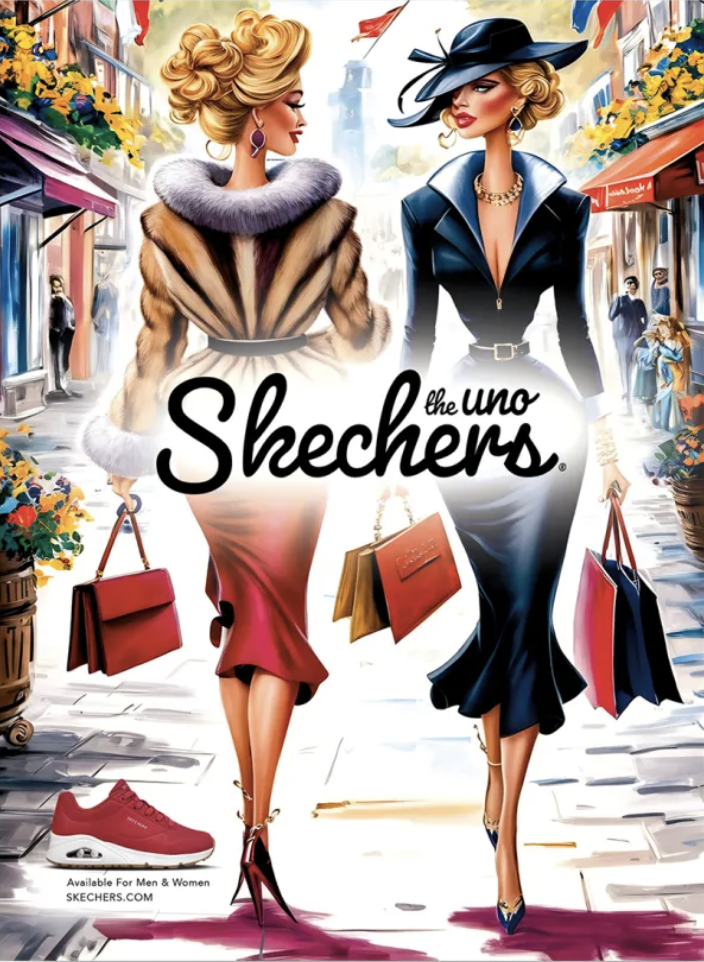
Given the number of industry advertising awards, I'm
surprised that there isn't one devoted to AI ads yet. I mean, even the Cannes Lions, which recognizes more than 30 discrete advertising categories, doesn't have one yet.
I'm sure that's about
to change soon, but in lieu of a formal one, I received a best/worst list of top and bottom five AI-generated or augmented campaigns from the team at SEO automation platform Chadix, so figured it
might get some industry awards-makers some ideas.
I'm not 100% sure of the Chadix team's criteria or methodology, but their descriptions explaining their presumably human-based rationales are
self-explanatory.
Here are the ones that got AI right:
Nike's "Never Done Evolving"
In an innovative celebration of Serena Williams’ career,
Nike used AI to digitally recreate two versions of the tennis legend – one from her 1999 Grand Slam debut and one from her 2017 Australian Open victory. The result was an emotional,
groundbreaking ad that garnered millions of views across social media and earned praise for its creative execution. By blending AI and storytelling, Nike created a powerful emotional connection that
resonated with viewers.
advertisement
advertisement
Coca-Cola's "Holidays Are Coming"
Coca-Cola’s attempt at a fully AI-generated Christmas ad was a bold experiment that paid off.
The iconic holiday truck, Santa, and winter scenes were all rendered using AI technology, giving the brand the ability to create multiple localized versions of the ad in a fraction of the time. The
campaign became a viral hit, driving significant engagement and discussions about the future of AI in holiday marketing.
Heinz's AI ketchup art
campaign
Heinz’s playful campaign invited consumers to generate AI art using the prompt “What does ketchup look like to AI?” The resulting images were shared
across social media, with consumers enthusiastically participating in the creative challenge. The result was over 800 million views, demonstrating the power of AI to drive user-generated content and
deepen brand engagement.
Samsung's
AI-driven Galaxy ad campaign
Samsung used AI to create an interactive video ad for its Galaxy Z Flip 5, showcasing the phone’s unique features in an AI-generated
digital world. The ad featured immersive AI visuals and allowed users to interact with the campaign through their phones, customizing elements in the video. The campaign garnered 50 million views in
its first week and was praised for its innovative approach to AI in marketing.
Netflix's AI-generated movie poster series
Netflix released a series of AI-generated movie posters for upcoming shows, tailored to
individual viewers based on their genre preferences. The campaign saw a 22% increase in user interaction, with audiences intrigued by the personalized ads. This campaign has set a new precedent for
how AI can enhance content recommendations and viewer engagement.
And here are those who got AI wrong:
Toys "R" Us' Sorsa text-to-video brand film
In 2024, Toys “R” Us launched an AI-generated brand film using OpenAI’s text-to-video technology. The ad’s AI-created visuals left many viewers uneasy, with some
finding the characters “creepy” and the overall tone “soulless.” The backlash on social media was swift, with many critics calling out the lack of human
creativity behind the ad.
Mango's AI
fashion models campaign
Mango’s attempt to showcase its latest fashion line with AI-generated models backfired when viewers noticed the unrealistic, lifeless visuals. The use
of AI to replace real models was met with accusations of “cheapening the art of fashion photography” and sparking discussions about the future of work for models and
photographers in the creative industry.

Skechers' AI-generated print ad in Vogue
magazine
Skechers ran a full-page ad in Vogue using AI-generated images of models wearing their shoes. The campaign was called out for its lack of authenticity
– with critics pointing out that the AI visuals were riddled with glitches and imperfections. Despite the high-profile placement, the ad quickly became the subject of ridicule on social
media.

Microsoft's
AI-powered "Surface" campaign
Microsoft launched an AI-generated ad for its Surface laptop, using AI to create digital avatars interacting with the device. However, the
visuals felt awkward and unrealistic, leading to negative feedback. The "uncanny valley" effect was a major issue, with critics calling out the lack of human touch. The ad’s effectiveness was
questioned, and it received a 26% decrease in brand sentiment.
Amazon's AI-generated holiday ads
Amazon attempted to create an AI-generated ad campaign for
the holidays, using machine learning to design all the visuals. The result was criticized for being cold and impersonal, failing to evoke the warmth typically associated with holiday shopping. The ad
quickly became the subject of ridicule, with critics saying Amazon had “lost its soul” by relying too heavily on AI.